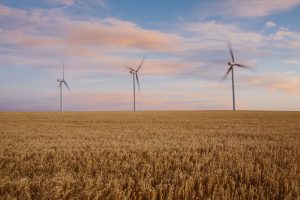The Sustainable Food Policy Alliance advocates for innovative, science-based solutions to take action against the costly impacts of climate change, build more resilient communities, promote renewable energy, support a circular economy, and further develop sustainable food and agriculture systems.
 Each SFPA member company has already set ambitious targets to reduce its impact on the planet, including greenhouse gas emissions, energy use, land and water use, packaging design and material use, ingredients sourcing, and more. Our climate change principles guide our work together and in broader coalitions to advance policies that are beneficial for the environment, while accounting for the specific business imperatives of our supply chains, including farmers, ranchers, and other producers.
Each SFPA member company has already set ambitious targets to reduce its impact on the planet, including greenhouse gas emissions, energy use, land and water use, packaging design and material use, ingredients sourcing, and more. Our climate change principles guide our work together and in broader coalitions to advance policies that are beneficial for the environment, while accounting for the specific business imperatives of our supply chains, including farmers, ranchers, and other producers.
Key policy priorities include:
- Urging U.S. policymakers to ensure that the Farm Bill and other farm policies reflect the pressing need to increase the scale of actions to address climate change and water quality and water conservation issues, focus on regenerative agriculture and improving soil health, and expand the deployment of renewable energy, particularly wind and solar. The Farm Bill should leverage all available tools, including research and public-private partnerships such as the Regional Conservation Partnership Program (RCPP), to make smart investments in conservation and sustainability.
- Exploring the economics of sustainability, including supporting emerging business models that use financial incentives to reduce emissions and transition to low-carbon alternatives, with a particular focus on ways to create value for farmers, ranchers, and others who are implementing leading edge practices to cut greenhouse gas emissions.
- Championing state- and regional-level low carbon policies, including accelerating the growth of renewable energy sources, building land-based solutions, and seeking opportunities for improved public-private coordination, particularly in the states and territories we call home or have an economic footprint.
We also recognize the need to listen and learn from other stakeholders on emerging sustainability issues, including:
To this end, we released a set of climate policy principles in April 2019, which we updated in July 2021 to reflect the movement in Washington on this issue. We also recognize the need to listen and learn from other stakeholders on emerging sustainability issues, including:
- Committing to addressing deforestation risks in agricultural supply chains. Forest conservation is an essential part of our overall efforts to meet science-based targets and create business pathways to achieve net zero emissions. We believe that a strong legislative approach is necessary to complement voluntary efforts by industry to address deforestation. Click to read our Principles on Forest and Natural Ecosystem Conservation.
- Seeking ways to support healthful diets that also support and contribute to environmental health either through voluntary company-led commitments or via public policy. We are especially focused on the intersection of climate change, water scarcity, food security, and public health.
Issue Spotlight: Circular Economy
Each SFPA member company has invested in making consumer product packaging more sustainable with a focus on recyclability, the circular economy, and climate change. Within our own companies, we are investing in improving recycling systems around the world, innovating our packaging design, and collaborating with suppliers, local communities, and retail customers to advance forward-looking solutions that help our consumers make a difference and impact the planet.
There is no single solution to packaging waste. It is essential that stakeholders, including companies, recycling operators, and federal, state and local governments, come together to make end-to-end system changes that will truly transform our waste management system into a circular economy. Click here to read our Packaging and Recycling Policy Priorities.
SFPA supports the development of an extended producer responsibility (EPR) program featuring a nationally consistent, economy-wide approach to packaging life cycle management. SFPA member companies participate in EPR programs globally, and we have used that experience to identify our policy priorities for an effective U.S. EPR program.
In addition, SFPA member companies have set ambitious goals to integrate postconsumer recycled content (PCR) into our packaging. Our PCR policy priorities reflect our support for PCR requirements that complement broader efforts to modernize and improve U.S. recycling infrastructure and ultimately improve the quality of PCR – especially for use in food packaging.
Read more about what each member company is doing on the environment:





